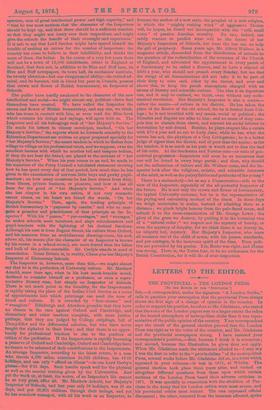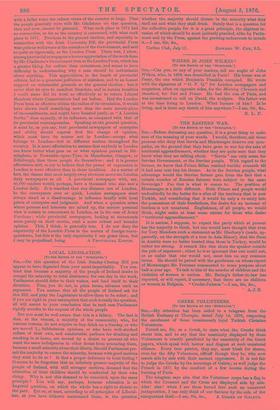LETTERS TO THE EDITOR,
THE PROVINCIAL v. THE LONDON PRESS.
(TO THE EDITOR OF THE " SPECTAT011.1
SIR,—A correspondent, under the signature "A London Scribe," calls in question your assumption that the provincial Press always shows the first sign of a change of opinion in the country. In order to support his position, he refers to Mr. Gladstone, who stated that the voice of the London papers was to a larger extent the reflex of the heated atmosphere of metropolitan clubs than it was repre- sentative of the public opinion of the country. Your correspondent says the result of the general election proved that the London Press was right as to the voice of the country, and Mr. Gladstone and the provincial newspapers wrong. I have restated your correspondent's position,—first, because I think it is erroneous ; and second, because the illustration he gives does not apply. When Mr. Gladstone made the statement alluded to—I may say I was the first to refer to the" provincialism" of the metropolitan Press, several weeks before Mr. Gladstone did so, in a letter which appeared in your columns—it was in 1871, at Whitby. The general election took place three years after, and turned on altogether different questions from those upon which certain sections of the London Press based their adverse criticism in 1871. It was specially in connection with the abolition of Pur- chase in the Army that his London critics were most severe, and his provincial critics most lenient. The one expressed official discontent ; the other, removed from the interests affected, spoke with a fuller voice the calmer views of the country at large. That the people generally were with Mr. Gladstone on that question, then and now, cannot be gainsaid. What took place in 1874 had no connection, so far as the country is concerned, with what took place in 1871. Previous to the general election, and especially in connection with the Irish University Bill, the provincial Press was quite as well aware of the mistakes of the Government, and said so quite as vigorously, as the London Press. There was, I allow, among provincial newspapers a keener appreciation of the work done by Mr. Gladstone's Government than in the London Press, which has a greater liking for culture than earnestness, and seems to have difficulty in understanding why a man should be enthusiastic about anything. This appreciation, in the hands of provincial editors, led to a generous palliation of mistakes, and to an honest support on substantial grounds at the general election ; but it never shut its eyes to manifest blunders, and in certain localities I could name did its work so effectively as to return Liberal Members where Conservatives had sat before. Had the London Press been as effective within the radius of its circulation, it would have shown itself something more than the mere mouth-piece of its constituents, and might have boasted justly, as "A London Scribe" does unjustly, of its influence, as compared with that of its provincial contemporaries. Speaking on the general question, it must be, as you say, that provincial newspapers of enterprise and ability should express first the change of opinion, which must have its source not in London—except what belongs to London—but in different centres throughout the country. It is mere affectation to assume that anybody in London can know better what goes on or what opinions prevail in Bir- mingham, in Newcastle-upon-Tyne, in Manchester, Glasgow, or Edinburgh, than those people do themselves ; and it is greater affectation still, to try to believe that the power of expression in London is more effective than in those localities. As a matter of fact, the classes that most largely sway elections never see London daily newspapers at al A provincial newspaper with, say, 40,000 readers would, perhaps, have a thousand who also saw a London daily. It is manifest that any distance out of London, be the conveyance ever so quick, London newspapers must always stand at a disadvantage in influence locally with local prints of enterprise and judgment. And when a question arises where persons and interests are mixed up, the narrow personal view is certain to concentrate in London, as in the case of Army Purchase ; while provincial newspapers, looking at movements more purely on their merits, emit a more robust and broader opinion. 'This, I think, is generally true. I do not deny the superiority of the London Press in the matter of foreign corre- spondence, but this is the only superiority I can grant them, but































 Previous page
Previous page